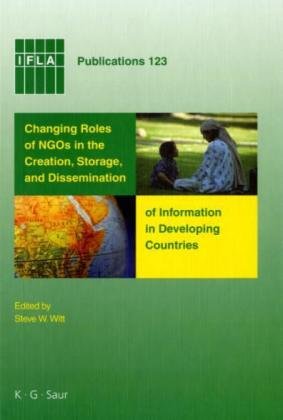

Most ebook files are in PDF format, so you can easily read them using various software such as Foxit Reader or directly on the Google Chrome browser.
Some ebook files are released by publishers in other formats such as .awz, .mobi, .epub, .fb2, etc. You may need to install specific software to read these formats on mobile/PC, such as Calibre.
Please read the tutorial at this link: https://ebookbell.com/faq
We offer FREE conversion to the popular formats you request; however, this may take some time. Therefore, right after payment, please email us, and we will try to provide the service as quickly as possible.
For some exceptional file formats or broken links (if any), please refrain from opening any disputes. Instead, email us first, and we will try to assist within a maximum of 6 hours.
EbookBell Team

5.0
18 reviews 
ISBN 10: 3598220308
ISBN 13: 978-3598220302
Author: Steve W. Witt
Non-governmental organizations (NGOs) are growing exponentially. In 1993, the Yearbook of International Organizations listed 16,000 internationally recognized NGOs. By 2004, this number was 63,000. With this increase comes a staggering growth in the activities and intellectual output of NGOs working on a local and international level. As the mission of both libraries and NGOs increasingly intersect, these organizations must collaborate to provide essential services that revolve around the creation, dissemination, and storage of information. This volume's eight essays focus on collaborative work between NGOs and libraries in the study and resolution of global issues ranging from AIDS to food security, and social transformation.
Front Cover.
Half Title Page.
Other Frontmatter.
Title Page.
Copyright Page.
Contents.
Foreword.
1: The Warning Voice—NGOs and Information.
2: The Permanence of Smoke: A Challenge to Research Libraries to Showcase and Preserve the Work of NGOs Serving Developing Countries.
3: Working in Partnership to Build Knowledge Societies.
4: Information for Action: The Approach Used by NGOs to Foster and Strengthen Civic Life: A Case Study from Argentina.
5: NGOs and the Egyptian Information Society: New Partnerships, New Roles.
6: NGOs, ICTs and Information Dissemination in Asia and Oceania.
7: The NGO Response to HIV/AIDs Information Provision in Zambia.
8: Information System for NGO Libraries in Pakistan: A Proposed Model for Organizing the Grey Literature.
Notes.
ifla 123 changing roles of ngo's in developing countries
what roles do ngos play in developing countries
the influx of ngos to impoverished areas leads to
ngo in developing countries
which roles do ngos play in international relations
Tags: Steve W Witt, IFLA, Changing Roles, NGOs, Developing Countries